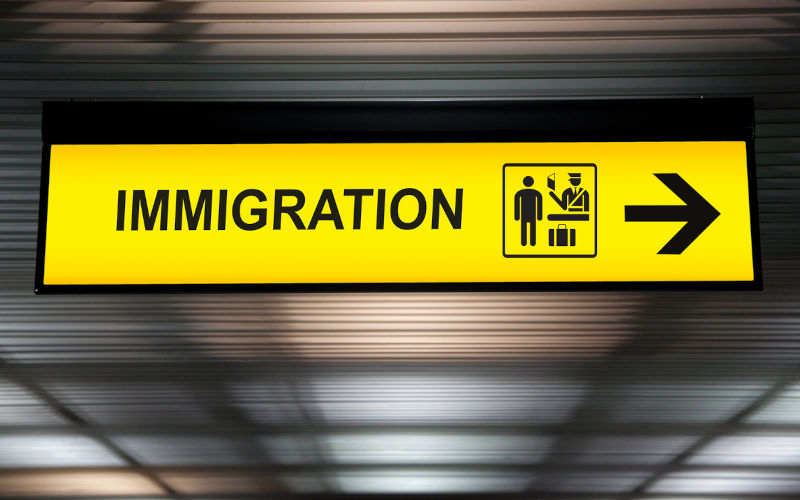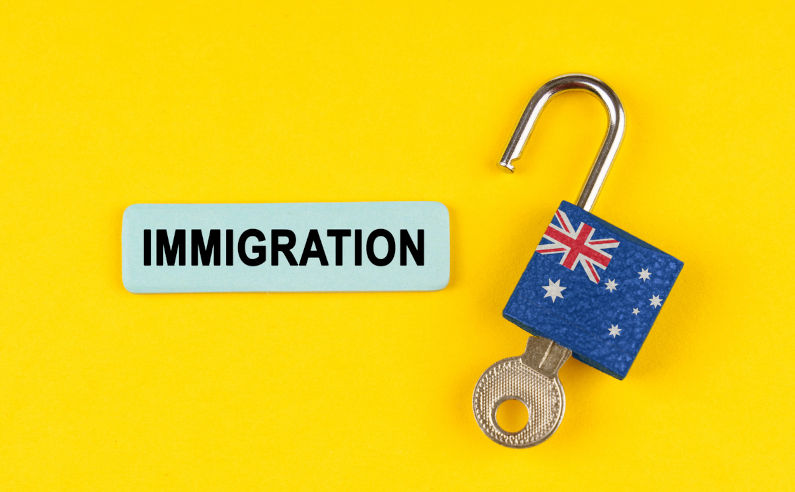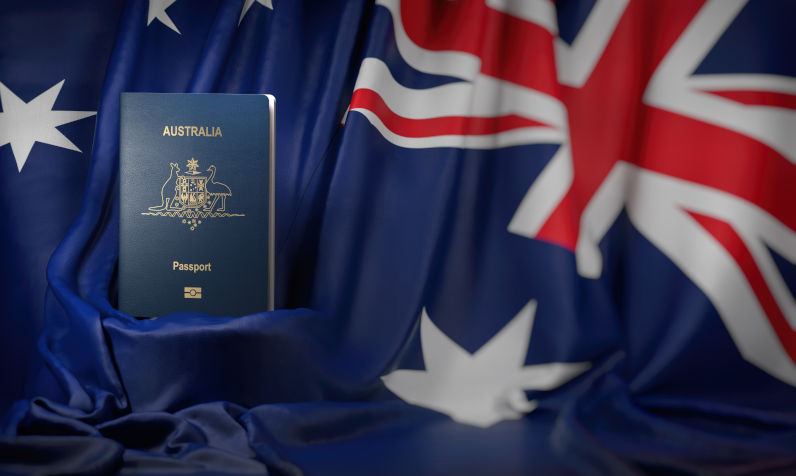Peter's recent articles

19 January 2026
Best of 2025 - Australia’s immigration 'debate' is rhetoric, not policy
Australia is awash with immigration rhetoric, but little of it is grounded in evidence, clear definitions or serious policy alternatives. Rather than an informed public debate, Australians are being offered slogans, blame and ambiguity.

4 December 2025
Australia’s immigration 'debate' is rhetoric, not policy
Australia is awash with immigration rhetoric, but little of it is grounded in evidence, clear definitions or serious policy alternatives. Rather than an informed public debate, Australians are being offered slogans, blame and ambiguity.

29 July 2025
The new Commonwealth office of Multicultural Affairs unveiled
A new Commonwealth Office of Multicultural Affairs has been established within the Department of Home Affairs.

25 March 2025
Devaluing Australian citizenship
Public commentary on Peter Dutton’s possible referendum on a ministerial discretion to deprive dual nationals of their Australian citizenship has focused on whether or not this is just a thought bubble and whether or not it is politically wise to be holding yet another referendum. The real issue goes much deeper, to the merits of the proposal. Ministerial powers to remove Australian citizenship fundamentally devalue it. Dual nationals are the biggest losers.

12 March 2025
Australian immigration and the federal election
The Albanese Government has done a reasonable job in repairing the immigration train wreck it inherited from the Coalition. However, excessive caution and fear of being wedged has severely limited its achievements. In the forthcoming election, the Dutton Opposition can be expected to be short on policy, but to stoke up fears about border security and foreigners. He will borrow from the nasty Trump playbook when convenient. Australia deserves better immigration policy and administration.

22 August 2024
Australia has always found a way to bring in people from conflict zones
Australia has always found a way to bring in people suffering in conflict zones – when it wants to. There are well-established procedures that have worked effectively for decades between the immigration authorities and ASIO to make it happen safely.

1 August 2024
Labor’s immigration record and the zombie portfolio
Given the catastrophe they inherited from the Coalition Government, Labor’s immigration record over two years is actually quite good. Huge improvement is still required. They will remain seriously hampered by the Home Affairs portfolio construct and must eventually restore a freestanding Department of Immigration, Citizenship and Multicultural Affairs. Andrew Giles has been unfairly criticised for his handling of a problem that was of Peter Dutton’s making.

27 May 2024
Immigration removal legislation: put away the sledgehammer
The High Court decision in the ASF17 case removed the apparent driver for the government’s sledgehammer immigration removal legislation. There is little evidence that the legislation would work as intended. A sledgehammer is not much use for a problem which is more akin to undoing a couple of tight screws. The government should drop the legislation and completely redevelop its immigration compliance and removal strategy.

3 April 2024
Sledgehammer immigration removal legislation
The government’s new legislation represents a sledgehammer approach to twin immigration removal problems - non-cooperation by people who don’t want to be removed from Australia on the one hand and non-cooperation by their country of citizenship on the other. These problems are quite tricky, but they are not new. Alternative approaches are needed.

24 January 2024
Reviving Australian Citizenship: What the government needs to do
Australian Citizenship should be revived as a positive unifying element in a cohesive multicultural society. The Australia Day citizenship ceremony controversy is just a sideshow. The real issue is the completely unacceptable waiting times for processing Australian citizenship applications. The Abbott/Turnbull/Morrison government trashed the good work of previous Coalition and Labor governments by pursuing regressive citizenship policies. There is a big restoration job to be done.

19 December 2023
Reflections on the new migration strategy
The government’s new migration strategy is a commendable attempt to restore some shape to immigration policy and to deal with pressing short, medium and long-term policy problems. A massive implementation effort is needed to make it work. It comes at a time of a pathetic level of public discourse on immigration issues. Institutional change is needed to get immigration fully back on track.

21 November 2023
Use of immigration detention needs to be dramatically curtailed
The use of immigration detention in Australia has expanded well beyond its original intended purpose. It has become a political tool, a convenient proxy for dealing with issues that should be dealt with in other parts of government and a vehicle for delivery of immense cruelty. There was a certain inevitability that the High Court would eventually stop governments from misusing it.

28 July 2023
Offshore refugee processing funding allegations: How did we get here?
The Sydney Morning Herald and The Age have published serious allegations about millions of dollars of Australian government funding for Offshore Processing Centres finding their way through contractors to bank accounts controlled by South Pacific politicians. This comes on top of a history of criticism by the Auditor-General on how providers were selected and contracts managed by the Department of Home Affairs. The blocking of the Labor government’s “Malaysia Arrangement” by the Coalition and the Greens in 2011 was the strategic turning point that sent governments down the pathway to this sad destination.

2 May 2023
Parkinson immigration review: very good as far as it goes
The 190 page Parkinson Immigration Review provides a very good blueprint for the future, considering the limitations placed on it by its terms of reference and timeline. The government has circulated a “Migration Strategy” document for consultation picking up broad concepts in the review’s recommendations. There is much more work to be done to decide on, and implement, the best of this report and to deal with outstanding issues that it was not requested to cover.

27 April 2023
Direct access to Australian citizenship for New Zealanders is a good thing
The Albanese government decision to restore direct access to Australian citizenship for New Zealanders living here is a good thing. It defuses a social time bomb and removes an irritant in Australia-New Zealand relations.

20 April 2023
How to go about achieving better immigration policy and decision-making
It helps to apply all the lessons of the past correctly when considering learnings from a recent High Court decision about the use of personal Ministerial intervention powers under the Migration Act

21 February 2023
No basis for temporary protection visa scare mongering
Opening up access to permanent residence for long stay refugees on temporary visas is right and inevitable. The decision will not set off a major new surge of maritime asylum seekers. The Coalition and their supporters have selective memories. Temporary protection visas were never a deterrent anyway.

16 November 2022
The Australian immigration system is broken. Who knew? Who cared?
Mainstream media organisations apparently had neither the expertise nor the desire to recognise that the system was broken.

16 July 2022
Peter Hughes: Albanese is right to give New Zealanders a fairer go
The new directions that Prime Minister Albanese has foreshadowed to make life easier for New Zealanders in Australia in relation to citizenship, deportation and voting are the right way to go.

2 May 2022
Fixing Immigration: five things an incoming Labor government could do
Labor, if elected, has a big job ahead of it in fixing the immigration shambles that the Coalition has created in nearly 9 years of office.

22 January 2022
Long-term immigration detention has again become a pointless exercise in cruelty
The Howard government released long-term detainees into the community, but the current Coalition government refuses to do so for political reasons.
18 June 2021
The Sri Lankan family – just a case of bloody mindedness. A repost from 2019.
We await further operation of Federal Court processes before the future of the Sri Lankan family being held on Christmas Island is finally known. In the meantime, it’s worth reflecting on why the government has chosen to take such a hard line on this family.
14 October 2020
Migrants: how can we make THEM more like US?
In a crisis, the Coalition government thinks that migrants need to jump through higher hoops.
12 September 2019
The Sri Lankan family – just a case of bloody mindedness
We await further operation of Federal Court processes before the future of the Sri Lankan family being held on Christmas Island is finally known. In the meantime, it’s worth reflecting on why the government has chosen to take such a hard line on this family.
28 February 2019
PETER HUGHES The Coalition Government’s immigration shambles Part 2: What an incoming Labor government could do
The Abbott/Turnbull/Morrison government will go down as the worst Coalition Government in history in its handling of immigration. This is how an incoming Labor government might go about dealing with the shambles it will confront.
21 February 2019
PETER HUGHES. The Coalition Government’s immigration shambles Part 1
The Coalition Government is once more in its element screaming at Australians that only they can save us from hordes of maritime asylum seekers. But look at the record!
8 November 2017
PETER HUGHES. Citizenship for "them" and citizenship for "us"
There is great irony in the fact that the citizenship weapon which the government so recklessly aimed at migrants ended up blowing up in the face of its own parliamentarians.

5 July 2017
PETER HUGHES. Citizenship changes: poisonous and pointless
The government's proposed changes to the requirements for Australian citizenship are both poisonous and pointless. They are bad public policy and should be rejected by Parliament.
25 April 2017
PETER HUGHES. Citizenship Test Mark II - How much juice can you squeeze out of an orange?
It seems that Coalition governments have developed a habit of squeezing the citizenship orange for political advantage when there are some community concerns about migrants. Last week’s announcement by the Turnbull Coalition government, at a time of poor government performance in opinion polls, of a toughening of the Australian citizenship test for migrants has a familiar ring to it.
10 February 2017
PETER HUGHES. Losing the plot on immigration policy
If governments choose to make immigration policy based on populism, expect an increase in human suffering……
22 September 2016
TRAVERS McLEOD, PETER HUGHES, SRIPRAPHA PETCHARAMESREE, STEVEN WONG, TRI NUKE PUDJIASTUTI. Developing a regional refugee framework.
September has seen a surge of international summits. First came the G20 in Hangzhou, then ASEAN and the East Asia Summit in Vientiane, plus the Pacific Islands Forum in Pohnpei. And, on consecutive days this week, the United Nations in New York hosted a summit on refugees and migrants, followed by US President Barack Obama’s special leaders’ summit on refugees. Representatives from government, business and civil society gathered to decide how best to move the dial on unprecedented mass displacement. It’s easy to be sceptical of talkfests, but the New York summits carried special significance. They show that...
20 September 2016
PETER HUGHES. Who is running the show?
A new narrative. Why Australian immigration policy needs a positive approach With Pauline Hanson taking a hard-line on immigration in the Senate, it’s time for the government to change its tune or risk relinquishing the debate. It's time the Australian government put together a positive narrative for Australian immigration policy.
13 August 2016
PETER HUGHES. Manus and Nauru – time for the government to be creative
This is a repost of an earlier article by Peter Hughes on 28 April 2016. The Papua New Guinea (PNG) Supreme Court decision and the announcement by the PNG Prime Minister that Manus will be closed only bring forward the inevitable – the Australian government has to find a way to get the current caseload of refugees and asylum seekers out of PNG and Nauru. Realistically, the only option is Australia and New Zealand. Think for a moment about the other possibilities.
28 May 2016
TRAVERS McLEOD, PETER HUGHES, SRIPRAPHA PETCHARAMESREE, STEVEN WONG, TRI NUKE PUDJIASTUTI: Rohingya refugees and building a regional framework to manage refugee flows.
Part 1. The Andaman Sea refugee crisis a year on: what happened and how did the region respond? The Andaman Sea crisis a year ago catalysed important policy developments on forced migration in Southeast Asia. Part one recaps what happened, and how the region responded. In part two, we discuss what’s happened since the crisis, and what’s needed to avoid similar events in future. Twelve months ago, events in the Andaman Sea exposed the grave reality of forced displacement in Southeast Asia. This culminated in a crisis meeting between governments in Thailand on May 29, 2015. More than...
23 March 2016
Travers McLeod, Peter Hughes, Sriprapha Petcharamesree, Steven Wong, Tri Nuke Pudjiastuti. The Bali Process can do a lot more to respond to forced migration in our region.
The Bali Process on People Smuggling, Trafficking in Persons and Related Transnational Crime will hold a full ministerial meeting in Bali this Wednesday. The meeting will bring together ministers from 45 member countries for the first time in three years. The global context for the meeting is the current levels of displacement. Sixty million people are displaced – the highest level since the second world war. And governments around the world are struggling to respond effectively. This is a critical opportunity for the Bali Process to rise to a new level. Ministers should not miss the chance to...
2 March 2016
Peter Hughes, Arja Keski-Nummi, John Menadue. Part 3: Settlement Policy and Services.
This is a repost from 27/5/2015. 3.1 Overview The migration process starts in earnest after a visa is given to a migrant. Its success or otherwise is determined after the person arrives in Australia and becomes part of the workforce and community. Australia, along with the other great traditional migration countries, has sought to smoothly integrate migrants into its multicultural society, by assisting them to become quickly productive through specialised assistance if necessary, and providing a relatively. 3.2 Settlement Policy and Services Supporting migrant settlement is a cooperative effort between the Australian government and State/Territory...
1 March 2016
Peter Hughes, Arja Keski-Nummi and John Menadue. Part 2. Refugee Policy
A repost from 26/05/15 Part 2: Refugee Policy 2.1 Overview The current and future global environment for irregular migration is extremely challenging. Many more people are on the move globally to gain protection from persecution, security from conflict or greater economic opportunity - or a mixture of these things. The movement of people is being accelerated by growing awareness of the opportunities to move, new communications technology, cheaper transport and active facilitators. The United Nations High Commissioner for Refugees (UNHCR) states that global forced displacement of some 51 million people (17 million refugees, 33 million...
29 February 2016
Peter Hughes, Arja Keski-Nummi and John Menadue. Part 1: Immigration Policy and Administration.
This article and the two following articles were part of a policy series that was posted in May/June last year and subsequently published in book form 'Fairness, Opportunity and Security'. This is a repost from 25/5/2015. Overview This paper sets out a broad design for Australia's immigration, refugee and settlement policies for the coming decades. The issues are covered in three parts: Immigration Policy and Administration Refugee Policy Migrant Settlement and Citizenship Policy Part 1: Immigration Policy and Administration 1.1 Guiding Principles Australia's planned immigration program has played a major role in Australia's...
9 September 2015
Peter Hughes. Designing a more generous Australian response to the Syrian crisis
The Australian government announcement of 12,000 additional permanent places for Syrian refugees is a reasonable scale of response, if implemented the right way. Taken together with the existing program of 13,750 refugees, the new program constitutes a manageable 13% of the planned 2015–16 migration intake of 193,485 permanent visas. It is only 4% of the 632,000 people already in the country temporarily with work rights. The fact that the places are permanent is essential. There is no reason to believe that Syrian refugees will be able to return to their home country in the foreseeable future. However,...
23 June 2015
Peter Hughes. Subsidising foreign investment with visas.
Current Affairs Visas which give wealthy business people and investors a pathway to permanent residence and Australian citizenship through various forms of investment have been around for many years. The new twist, under the Government's recently announced 'complying investments' for the Significant Investor Visa, is to channel some money out of safe investments and into venture capital and start-ups. The $5 million worth of investment that a foreign investor must make in Australia to qualify for a visa must now include at least $500,000 in eligible Australian venture capital or private equity funds investing in start-ups and small private...
14 June 2015
Peter Hughes. The War on Australian Citizenship
Current Affairs It's hard to be sure when the War on Terror became the war on Australian citizenship. I think it started in March 2014 when the Independent National Security Legislation Monitor was persuaded to recommend in his report[1] that the Minister for Immigration and Border Protection be given the power to revoke the Australian citizenship of dual citizens on national security grounds. Even though the idea of dealing with Australian Jihadists by revoking their Australian citizenship has been around since then, there has not been a convincing sense of urgency or clarity about it as an effective...
29 May 2015
Peter Hughes. Citizenship Revocation: a very limited tool in the fight against Jihadists
This is a repost of an article by Peter Hughes which appeared on 20 February 2015. This repost is relevant in light of recent discussion on revocation of citizenship. Liberal Federal MP, Andrew Nikolic, has put back on the agenda the question of changing the law on Australian Citizenship revocation as part of the fight against Australian Jihadists.[1] He writes: …the issue of state citizenship – particularly that of dual nationals – will be an increasingly important battleground in the continuing War on Terror Those who persist in associating themselves with terrorist causes must...
27 May 2015
Peter Hughes, Arja Keski-Nummi, John Menadue. Part 3: Settlement Policy and Services.
Fairness, Opportunity and Security. Policy series edited by Michael Keating and JohnMenadue. 3.1 Overview The migration process starts in earnest after a visa is given to a migrant. Its success or otherwise is determined after the person arrives in Australia and becomes part of the workforce and community. Australia, along with the other great traditional migration countries, has sought to smoothly integrate migrants into its multicultural society, by assisting them to become quickly productive through specialised assistance if necessary, and providing a relatively. 3.2 Settlement Policy and Services Supporting migrant settlement is a cooperative effort between...
26 May 2015
Peter Hughes, Arja Keski-Nummi and John Menadue. Part 2. Refugee Policy.
Policy Series Part 2: Refugee Policy 2.1 Overview The current and future global environment for irregular migration is extremely challenging. Many more people are on the move globally to gain protection from persecution, security from conflict or greater economic opportunity - or a mixture of these things. The movement of people is being accelerated by growing awareness of the opportunities to move, new communications technology, cheaper transport and active facilitators. The United Nations High Commissioner for Refugees (UNHCR) states that global forced displacement of some 51 million people (17 million refugees, 33 million internally displaced...
25 May 2015
Peter Hughes, Arja Keski-Nummi and John Menadue. Part 1. Immigration Policy and Administration.
Fairness, Opportunity and Security Policy series edited by Michael Keating and John Menadue. Overview This paper sets out a broad design for Australia's immigration, refugee and settlement policies for the coming decades. The issues are covered in three parts: Immigration Policy and Administration Refugee Policy Migrant Settlement and Citizenship Policy Part 1: Immigration Policy and Administration 1.1 Guiding Principles Australia's planned immigration program has played a major role in Australia's development over the last 70 years – directly adding 7 million people, including 800,000 humanitarian entrants, to Australia's population and dramatically diversifying Australia from...
27 November 2014
Peter Hughes. Reintroduction of Temporary Protection Visas -Time to Negotiate
In the last few days of the 2014 Parliament, the controversial Migration and Maritime Powers Legislation Amendment (Resolving the Asylum Legacy Caseload) Bill 2014 remains to be considered. The Bill contains a wide range of proposed changes to the asylum system reflecting, amongst other things, concern by the government that the current system is too heavily weighted towards approving asylum claims – a concern shared, but not acted on, by the previous government before losing office. It is unlikely that all of this complex mix of changes will get through the Senate. The most hotly contested part...
1 September 2014
Peter Hughes. Australian Jihadists: Is Revoking Citizenship the Answer?
One of the policy solutions being considered by the Australian government to deal with the expected problem of returning Australian jihadists is to preclude their return to Australia, or expel them, by revoking their Australian citizenship. The recently released report of the Independent National Security Legislation Monitor (INSLM)[1] recommends that the Minister for Immigration and Border Protection be given the power to do this on national security grounds. The idea of using Australian citizenship legislation to indirectly solve a problem that cannot be solved directly is not new. Some time ago there were calls to revoke the Australian...
10 January 2014
Repost: Nation building or border policing? Guest blogger: Peter Hughes
This was posted on November 15, 2013. Increasingly refugee policy is portrayed in terms of border protection and stopping the boats. We are losing sight of the enormous nation-building benefits that we have received from immigrants and refugees. John Menadue The repositioning of the Immigration and Citizenship portfolio as Immigration and Border Protection was a clear indication by the incoming government of its political priority - stop the arrival of maritime asylum seekers! In the process of shuffling programs around to accommodate this, Australia lost something. The settlement programs that provide initial support to migrants and...
6 November 2013
Are current maritime asylum seeker policies working? Guest blogger: Peter Hughes
So what if current maritime asylum seeker policies are working? I mean that question in the narrow sense of reducing irregular maritime arrivals to a trickle. The arrival figure of some 339 persons for October 2013 announced by the government represents only 16 per cent of October 2012 arrivals. Although it is only the figure for a single month, this is a significant change. If arrivals were to level out at this rate, it would represent 4068 arrivals per year, compared to some 25,000 arrivals in 2012 – 13. It is quite possible that the announcement of...
